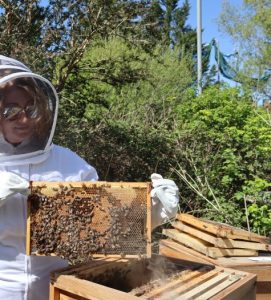Coronavirus business round-up: Latest news across the North West

A new supermarket trolley cleaning machine could be crucial in the UK’s battle against the spread of coronavirus – and potentially help save lives.
Clean Trolley, which was invented in the Netherlands and is being distributed by Lancashire-based company Wilkinson Mobile Catering, functions in a similar way to a car wash.
The trolley is moved through the machine and the entire trolley, including the wheels, is sprayed and cleaned with viricide which effectively kills off COVID-19 and other viruses.
It allows an entire row of trolleys to be pushed through and can completely clean 30 in under 30 seconds, meaning not only is it much more thorough than the current method of a retail assistant wiping the trolley bar handle down by hand, but it’s also much more efficient.
The machines are being sold at a rate of around 200 a week in Germany, appearing in the country’s Lidl and Aldi supermarkets.
Mike Wilkinson, managing director of Wilkinson Mobile Catering, said: “Given the importance now attached to clean shopping spaces, Clean Trolley would be a vital boost in the effort to promote public hygiene and limit the spread of COVID-19.
“At the moment, everyone is having to reinvent themselves and work out how to do this in an efficient manner.
“Supermarkets are doing all they can in this hugely challenging time, but Clean Trolley would help them to be even more effective and provide customers with a trolley they can be safe in the knowledge that a trolley is 100% virus free.”
Wilkinson Mobile Catering will also donate 10% of profits to the NHS charities fund, and the intention is to run it out to every UK supermarket.
However, with the threat of a second spike in infections, Mike said the product could also benefit the health service and locations where large groups of people will gather: “We’re also thinking about the hospital sector, for things such as wheelchairs and beds, and airports.
“For anything that is portable but not electrical, that is handled by large groups of people and that could spread the coronavirus inadvertently, Clean Trolley will minimise that risk going forward.”
::
Fusion21, the Liverpool-based procurement organisation and social enterprise, has donated £100,000 through its Foundation.
Recipients are the Charities Aid Foundation (CAF) and the Coronavirus Emergency Fund.
The emergency fund has been set up as charities face increasing pressures due to the coronavirus crisis.
During the pandemic many charities are facing financial difficulties and are struggling to deliver much-needed support to their communities across the UK, so the fund will help to minimise the disruption by offering one-time grants of up to £10,000, which will be made available to help organisations survive during the current health emergency.

Chris Murray
CAF were highlighted by Fusion21 as an organisation it would like to help, mainly due to the fact they are able to channel funding down to a community level quickly and effectively.
Chris Murray, Fusion21 chair, said: “We selected CAF as they have the ability to help local charities quickly – this will really help to address charity sector resilience during, and after, the COVID-19 pandemic.
“Also, the charities that CAF support have a very similar spread across the UK to our Fusion21 member organisations, ensuring the donation will also reach out to benefit our members communities.”
One of the key aims of the Fusion21 Foundation is to create a positive and sustainable social impact in the communities they work in, across the UK.
Monica Brown, CAF’s head of charity advisory and programmes, said: “CAF set up this fund to get speedy help to small charitable organisations across the UK and we are very proud to work with groups such as Fusion21 to grow the fund and help as many charities as possible to keep their doors open, cover essential costs and be there for our most vulnerable when they are needed in the days and months ahead.”
::
Manchester-based Pilot Group is donating more than 1,900 protective visors to frontline NHS staff, trusts and hospices across the North West after staff and volunteers within Pilot Group worked to design and manufacture the visors with the guidance of the NHS.
The much-needed PPE is being delivered to NHS workers at multiple locations across Wrightington, Wigan and Leigh NHS Foundation Trust and the East Lancashire NHS Trust over the coming weeks after undergoing thorough testing to ensure they do their job of protecting the frontline key workers.
Pilot Group reopened its manufacturing facility when it realised it had the tools and materials disposal to create the protective visors that have been lacking.
Staff and volunteers across the group designed a prototype before starting to mass produce as many, and as quickly as possible, to meet the demand.

Grace Bowden demonstrates Pilot Group’s PPE visor
Simone Peppi, chief operating officer, said: “I couldn’t be prouder of our workforce – this has been a combined effort from so many staff within our group.
“When we took the difficult decision to furlough some staff within the Government guidelines, our colleagues looked at the ongoing situation regarding PPE and wondered whether there was a suitable visor that we could design or manufacture to help protect keyworkers.
“When we realised we had the capability to make protective visors for NHS frontline workers we immediately re-opened the manufacturing facility and staff and volunteers started working on a prototype.
“Now, following their dedicated efforts, we have 1,900 visors being delivered to trusts around the North West over the coming weeks.”
He added: “Pilot Group’s mission is to make the place you live and work, smart, safe and sustainable. As a business, we are immensely proud and grateful that we had the equipment and skilled workers in place to be able to deliver this vital PPE to our wonderful and courageous NHS frontline workers.
“We are endeavouring to source further materials to help manufacture more PPE so we can continue to support key workers as much as possible in this unprecedented time.”
::
Networx3 bosses are buzzing as their new beehive goes from strength to strength – because of the lockdown.
The blown fibre optic installation firm introduced the Networx3 beehive at their headquarters in Great Harwood, Lancashire, just before the COVID-19 lockdown.
Tucked away behind Networx3’s two-storey premises on an industrial estate, the bees are flourishing thanks to the UK’s ‘stay at home’ policy.
Only 20 feet away from Networx3’s busy car park, where vans and lorries come and go all day, the hive, which is surrounded by native wildflowers and hedgerow, is now home to a 7,000-strong colony of bees.
Founder and managing director, Ian Ashworth, said: “It might seem a strange place to establish a beehive – the middle of an industrial estate in Lancashire – but we wanted to do our bit to bring bees back from the brink.
“They’re in a place where they’re safe, hidden from view and they’re clearly loving it here.
“As a company we are very environmentally aware and passionate about protecting wildlife, so, having a beehive on our premises sits well with our core values.
“Myself, and all the staff, can’t wait for the first jar of Networx3 honey later this year.”

Networx3 commercial director Caroline Earnshaw and bees
At the end of August the honey will be harvested with the hive capable of producing a bumper crop of up to 45lbs of honey – enough to fill 55 jars.
The hive was set up, and is checked weekly, by Accrington bee-lover Steve Llewellyn, who introduced a queen bee and 4,000 bees in March.
Eventually the colony will swell to 40,000-strong at its peak later this year.
Steve said: “Bees are at work 24 hours a day, seven days a week. They don’t sleep. As soon as the sun is up and it’s warm enough they’ll be out foraging.
“Networx3 have picked a brilliant place to have a beehive because it’s secure and it’s tucked away, so you’d never know it was there. There’s lots of places for the bees to forage close by so it’s an ideal position.”
Networx3, whose clients include government departments, critical infrastructure sectors, mobile phone giants and renewable energy utility companies, is best known for installing Europe’s biggest fibre optic cable network in Manchester.








